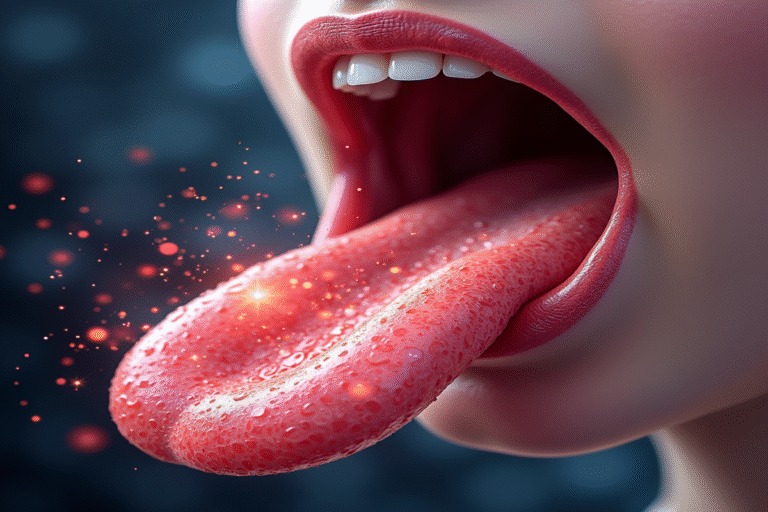Have you ever noticed how quickly your tongue recovers after accidentally biting it or burning it with hot coffee? What might take days or weeks to heal elsewhere on your body often disappears from your tongue within hours or a few days. This remarkable healing ability isn’t just convenient—it’s a fascinating example of specialized evolutionary adaptation.
A unique healing environment
Your tongue exists in one of the body’s most extraordinary healing environments. Several factors contribute to its impressive regenerative abilities:
The power of saliva
Saliva isn’t just for digestion—it’s a healing powerhouse. It contains:
- Epidermal growth factor (EGF) – a protein that stimulates cell growth and accelerates wound healing
- Antimicrobial compounds – including lysozyme, lactoferrin, and immunoglobulins that help prevent infection
- Tissue factor inhibitors – compounds that help control blood clotting
When you injure your tongue, these components immediately go to work, creating an optimal environment for rapid healing.
Exceptional blood supply
The tongue is one of the most vascular organs in your body, with an intricate network of blood vessels. This rich blood supply delivers a constant stream of oxygen, nutrients, and immune cells to injured areas. More blood flow means faster healing—it’s like having a superhighway for your body’s repair team.
Rapid cell turnover
The surface of your tongue is covered with stratified squamous epithelial cells that regenerate remarkably quickly. While skin cells typically replace themselves every 27 days, the epithelial cells on your tongue can turn over in as little as 3–7 days. This means the tongue can replace damaged cells much faster than most other body parts.
The healing process in action
When you bite or burn your tongue, a sophisticated sequence of healing events begins almost immediately:
- Hemostasis – blood vessels constrict and platelets form clots to stop bleeding
- Inflammation – white blood cells rush to the area to fight potential infection
- Proliferation – new cells multiply rapidly to replace damaged tissue
- Remodeling – the new tissue organizes and strengthens
What makes the tongue special is how compressed this timeline becomes. Processes that take weeks elsewhere in the body can occur in days or even hours in the tongue.
Evolutionary advantages
This rapid healing isn’t just convenient—it likely evolved as a crucial survival mechanism. As one of the most frequently used and exposed organs, the tongue needed to recover quickly from injuries to maintain vital functions like eating, drinking, and speaking. Individuals with faster-healing tongues would have had survival advantages throughout human evolution.
Surprising research findings
Scientists studying oral wound healing have made some fascinating discoveries:
- Tongue wounds heal with minimal scarring compared to skin wounds of similar depth
- The oral environment actually accelerates healing despite being filled with bacteria
- Certain compounds in saliva are being studied for potential use in advanced wound-healing medications
Some researchers are even investigating how the principles of oral wound healing could be applied to improve healing in other parts of the body—potentially revolutionizing treatment for chronic wounds and reducing scarring after surgery.
The paradox of pain
Despite its rapid healing, tongue injuries can be disproportionately painful. This is because the tongue contains an extremely high concentration of sensory receptors—it needs this sensitivity for its role in taste and speech. Each cubic centimeter of the tongue contains more pain receptors than most other body regions, making even small injuries feel significant.
This heightened sensitivity likely serves as a protective mechanism, discouraging behaviors that might damage this essential organ and alerting us immediately when something might be wrong.
Caring for tongue injuries
While the tongue heals quickly on its own, you can support this process by:
- Rinsing with salt water to help keep the area clean and prevent infection
- Avoiding spicy, acidic, or extremely hot foods that might further irritate the wound
- Staying hydrated to maintain optimal saliva production
In most cases, minor tongue injuries will heal completely within a week, often without any visible trace of the original wound—a remarkable feat of biological engineering.
The next time you accidentally bite your tongue, take a moment to appreciate the sophisticated healing mechanisms at work. Your tongue’s ability to rapidly repair itself is a testament to the body’s remarkable capacity for regeneration, refined by millions of years of evolution.





